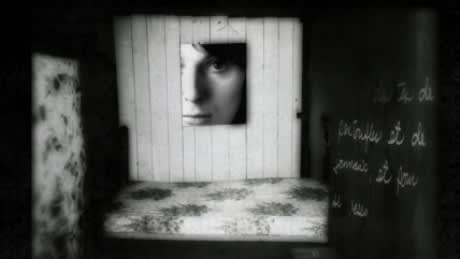Writer, director, actress, feminist, mother and artist, Paule Baillargeon, has been integrated with the Canadian film world for the last four decades, directing feminist art films and documentaries throughout the years and winning a Genie for her acting in I've Heard the Mermaids Singing. Known mainly for her performances in successful French-Canadian films like Jesus of Montreal and August 32nd on Earth--or within the industry and art world for directing a documentary on her friend, Claude Jutra—her oblique and self-consciously self-indulgent documentary, In Pieces, tells her story through her eyes, in fragments with mixed styles.
Jumping between various years of her life, all introduced through voiceover to contextualize her perspective, Baillargeon uses animation, photographs and home videos to shed insight on her experiences and changing ideology over the years, juxtaposing her life experience with the changing landscape of Quebec and women's rights.
Noting early that her childhood was earmarked by two traumatic events—her mother insulting a drawing she was initially proud of and her father giving her a smutty book to read—she demonstrates how these moments are infused throughout her works. Her rudimentary drawings of the female form, which litter the many segments through the film, then work as an act of defiance over her socially insecure, repressed and constantly performing mother, much as her use of women in red dresses in her art films speak to the forced premature sexual awareness her father injected into her childhood.
As the documentary progresses and she focuses on her adult years, a strong, angry feminist voice emerges, noting the appropriation of women by men limited mentally by having implicit power and being implicitly validated, culturally speaking, for sheer id impulse. The film also gravitates from the voiceover assertion of proposed mental illness to one of empowerment, where the contrary female perspective is acknowledged in the arts world rather than being glibly dismissed as crazy or ridiculous.
In such, Baillargeon's work reaches beyond the vacuum of her own life experience, commenting on the ever-changing landscape of gender politics and Canadian arts. There are still some imbalances—a nostalgic love of her deceased pet dog mirrored by a weirdly glossed over indifference to her experience as a mother—that pose more questions than they answer, but In Pieces does work as a culturally relevant testament to social change.
It also doesn't hurt that there are occasional rants about shoving Christmas trees up people's asses followed by a drawing of a naked women with a giant turquoise vagina.
In Pieces screens at the TIFF Bell Lightbox on Sunday, November 11th at 7pm.
(NFB)Jumping between various years of her life, all introduced through voiceover to contextualize her perspective, Baillargeon uses animation, photographs and home videos to shed insight on her experiences and changing ideology over the years, juxtaposing her life experience with the changing landscape of Quebec and women's rights.
Noting early that her childhood was earmarked by two traumatic events—her mother insulting a drawing she was initially proud of and her father giving her a smutty book to read—she demonstrates how these moments are infused throughout her works. Her rudimentary drawings of the female form, which litter the many segments through the film, then work as an act of defiance over her socially insecure, repressed and constantly performing mother, much as her use of women in red dresses in her art films speak to the forced premature sexual awareness her father injected into her childhood.
As the documentary progresses and she focuses on her adult years, a strong, angry feminist voice emerges, noting the appropriation of women by men limited mentally by having implicit power and being implicitly validated, culturally speaking, for sheer id impulse. The film also gravitates from the voiceover assertion of proposed mental illness to one of empowerment, where the contrary female perspective is acknowledged in the arts world rather than being glibly dismissed as crazy or ridiculous.
In such, Baillargeon's work reaches beyond the vacuum of her own life experience, commenting on the ever-changing landscape of gender politics and Canadian arts. There are still some imbalances—a nostalgic love of her deceased pet dog mirrored by a weirdly glossed over indifference to her experience as a mother—that pose more questions than they answer, but In Pieces does work as a culturally relevant testament to social change.
It also doesn't hurt that there are occasional rants about shoving Christmas trees up people's asses followed by a drawing of a naked women with a giant turquoise vagina.
In Pieces screens at the TIFF Bell Lightbox on Sunday, November 11th at 7pm.
